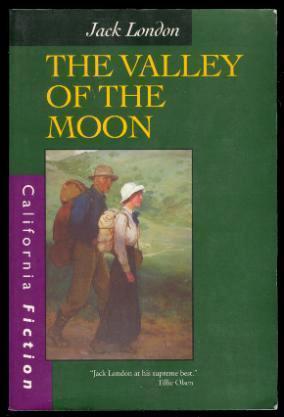
The Valley of the Moon by Jack London (2006. Hard Press. Kindle version. ISBN 978-1406946253)
I loaded this old London novel I’d never heard of because my second son and his wife surprised us in naming their daughter, our first granddaughter, Saxon. I’d never heard the name and when I asked Dylan where they came up with such a lovely, unique name, he told me Saxon was the female protagonist in a long-forgotten Jack London novel he once enjoyed. Turns out that wasn’t the only surprise in nomenclature. Saxon’s middle name is Mercedes, and my wife and I presumed that was to honor the child’s maternal great grandmother, Ann Mercedes Raymond Privette. That’s true, Dylan advised, but then I ran across a character named Mercedes in the book and I knew my son had pulled one over on us! To the book.
There’s a lot to enjoy in this novel. It’s a snapshot of California, particularly the rough and tumble of early 1900s Oakland, the setting for the first third or so of the story. Saxon is a laundress in a commercial laundry, working her hands and fingers and bones to weariness for a dollar or so a day under deplorable, non-unionized conditions alongside other women. She meets Billy Roberts, a sometime prizefighter and full time teamster whose ability with horses and fists is legendary. The two fall in love, marry, and set up housekeeping in a working class neighborhood of Oakland. True to the times, once married, Saxon quits working outside the home, becomes pregnant, loses the child, and then, economic disaster strikes: Billy’s employer is caught in the middle of a Teamsters Union strike. The boxer ends up in jail after a brawl over scabs, his arms broken by company thugs, and the couple loses everything. Instead of trying to hang on in Oakland, trying to scrounge up enough work to get by, Saxon and Billy set off on a journey to find, as it is coined in the beginning of their walk about California, “the valley in the moon.” At some point, with no real explanation, the catch phrase changes to “valley of the moon.” In either case, the object of Saxon and Billy’s journey by train, foot, stagecoach, and wagon replicates the migration of their forefathers and mothers from the East Coast through the Plains to California, though the protagonists’ peregrination is limited to California and a brief foray into southern Oregon.
London’s dialogue evokes a long-forgotten time, a voice and a diction that, interestingly, I heard distantly in phrases that my deceased father-in-law, a railroader, used into the 21st century. The author’s reliance upon speech patterns and expressions of his time, essentially contemporaneous to the story he tells, gives the plot authenticity. What isn’t authentic, at least to my eye, is the luck and happenstance that prevails in favor of Saxon and Billy’s ultimate success. The narrative ends up being a tad tilted towards the hero and heroine with not nearly enough conflict and struggle to be faced on what surely must have been a physically demanding and emotionally desperate migration. Then too, because of the times and London’s status as a world-renowned writer of distinctly American stock, there are moments in the story when, despite the author’s socialistic and liberal views towards working men and women, he displays disdain for immigrants of color (the Japanese and Chinese) and Southern European origin (the Italians and Greeks). Though voiced primarily by Billy, who is uneducated, illiterate, and at times, abusive towards Saxon, the disparagement of The Other sometimes feels as if it is coming from London directly, as if he is standing behind Billy, urging on the young man’s Xenophobia. The simplicity of the main characters, Billy as the impulsive, physical specimen, Saxon as the thinking, planning, demure handmaiden to her prince, also grows a bit long, especially when London, having exposed his readers to a dark, explosive, and dangerous side of husband towards wife, avoids wading too deeply into the psychology and after-effects of spousal abuse.
In the end, the book held my interest. London’s descriptions of the landscape the pair encounters on their quest for a farm on “government land”, a place in the world they can call their own, are expertly drawn. They should be. The ultimate destination for Saxon and Billy, the valley of the moon, is a place London knew well, a place he and his second wife, Charmian Kittridge, knew like the proverbial backs of their hands. In some ways, this novel is a precursor to the classic worker migration story told by John Steinbeck in The Grapes of Wrath. That book is a classic. The Valley of the Moon isn’t, though I’m confident that the book’s namesake will be!
3 and 1/2 stars out of 5.
Peace.
Mark
PS Rather than buy the usual Christening gift for Saxon, I went online and found a gorgeous first edition copy of the book and had it shipped from London (no pun intended) to Duluth. We brought the book with us on a visit to the kids in North Dakota after the Christening. It’s now in a glass case courtesy of Grandma Rene’ and sits in a place of adoration in the Munger home in Williston.


